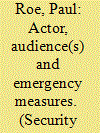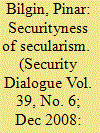| Srl | Item |
| 1 |
ID:
085436


|
|
|
|
|
| Publication |
2008.
|
| Summary/Abstract |
The concept of securitization has produced a considerable amount of debate over the meaning of security. However, far less attention has been paid to the role of audiences and their relationship to actors in the securitization process. Informed by the work of Thierry Balzacq (2005), and through analysis of the decision of the UK government to join with the USA in the 2003 invasion of Iraq, in this article I show that although the general public can indeed play a valuable role in providing an actor with `moral' support concerning the `securityness' of an issue, more crucial, however, is the `formal' support provided by parliament concerning the `extraordinaryness' of the means necessary to deal with it. My argument is thus that securitization can in this way be seen as a distinct two-stage process marked by a `stage of identification' and a `stage of mobilization'
|
|
|
|
|
|
|
|
|
|
|
|
|
|
|
|
| 2 |
ID:
085437


|
|
|
|
|
| Publication |
2008.
|
| Summary/Abstract |
Over the last decade, a range of actors have pressed for states and regional organizations to take action against the illicit trade in small arms and light weapons. Some regional bodies have responded with comprehensive plans of action and impressive policy responses; others have done very little. This article examines the `patchy' response of the Association of Southeast Asian Nations (ASEAN). It looks at how ASEAN played a mediating role between global norm entrepreneurs seeking to promote small arms norms in the region and member-states that opposed many of their goals.
|
|
|
|
|
|
|
|
|
|
|
|
|
|
|
|
| 3 |
ID:
085434


|
|
|
|
|
| Publication |
2008.
|
| Summary/Abstract |
Terrorism studies is fascinated with the terrorist actor. Though this may seem natural, the present article argues that a different perspective can be fruitful. From a constructivist point of view, terrorism is a social construction. The terrorist actor is a product of discourse, and hence discourse is the logical starting point for terrorism research. In particular, it is the discourse of the terrorists' adversaries that constitutes terrorist motivations, strategies, organizational structures and goals. Hence, the article suggests a shift of perspective in terrorism studies - from an actor-centred to a discourse-centred perspective.
|
|
|
|
|
|
|
|
|
|
|
|
|
|
|
|
| 4 |
ID:
085435


|
|
|
|
|
| Publication |
2008.
|
| Summary/Abstract |
Secularism is frequently portrayed as a security referent in present-day Turkey. But, what is it that makes secularism a security issue? Where are we to locate the `securityness' of secularism? Against prevailing accounts that privilege the domestic dimension, this article argues that the securityness of secularism in Turkey should be located in both the domestic and the international. This is not to suggest that secularism can be reduced to security, but it is to suggest that efforts to portray Turkey's secularism merely as a constitutive principle and an outcome of the project of Republican transformation, or as a means of safeguarding a particular vision of transformation through controlling religion, or as an instrument of national economic development, while rewarding in themselves, nevertheless miss an important set of dynamics that help to explain secularism's centrality to Turkey's politics.
|
|
|
|
|
|
|
|
|
|
|
|
|
|
|
|